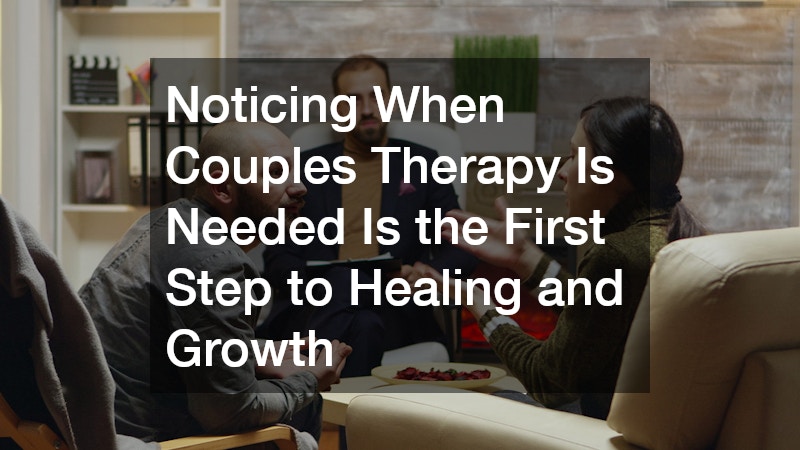Maintaining a healthy and fulfilling relationship requires effort, communication, and understanding from both partners. Over time, issues may arise that challenge the bond you share, and seeking help can be a proactive way to address these challenges. Couples therapy offers a safe space for partners to explore their differences, communicate more effectively, and find common ground. By addressing concerns with the guidance of a professional, couples can strengthen their connection and build a more resilient relationship.
1. How do I know if my relationship needs therapy?
1.1 Recognizing Conflict Patterns
Constant disagreements and unresolved arguments can signal deeper underlying issues in your relationship. Recognizing persistent patterns of conflict without progress suggests that professional intervention might be necessary.
When partners repeatedly argue about the same topics without resolution, it can create a cycle of negativity and resentment. Therapy can help identify these patterns and introduce strategies for resolving conflicts more effectively. Research indicates that couples often wait an average of six years of being unhappy before seeking help. Addressing conflict patterns early can prevent further emotional damage and restore harmony.
1.2 Identifying Emotional Distance
Emotional distance occurs when partners begin to feel disconnected from each other. This can manifest as a lack of interest in each other’s lives or reduced expressions of affection. Over time, emotional distance can lead to feelings of loneliness even when physically together, eroding the foundation of the relationship. Therapy provides a platform to express these feelings and work on rebuilding emotional intimacy. Couples who address emotional distance can rediscover their emotional bond and enjoy a more supportive partnership. Recognizing these signs early on can prevent further alienation and foster a more nurturing environment.
2. What are the signs of unhealthy communication?
2.1 Escalation and Cycles of Blame
Arguments that quickly escalate into shouting matches or blame games are indicative of unhealthy communication patterns. This destructive behavior often prevents couples from addressing the core issues in their relationship. Therapy can help couples understand their triggers and develop healthier ways to communicate during conflicts. By replacing cycles of blame with empathy, partners can work towards a more constructive dialogue. Effective communication requires both partners to listen actively and express their feelings honestly. With guidance, couples can learn to break the cycle and focus on solutions rather than fault-finding.
2.2 Silence and Withdrawal
When partners avoid communication or shut down during discussions, it can create an atmosphere of silence and withdrawal. This avoidance can stem from a fear of confrontation or feeling unheard, leading to unresolved issues. Therapy encourages open dialogue and provides tools to navigate difficult conversations. By addressing the reasons behind withdrawal, couples can rebuild trust and improve their communication skills. Overcoming silence requires dedication from both partners to engage actively and work on staying connected. Successfully breaking the silence can lead to a more collaborative and understanding relationship.
3. How does therapy help in rebuilding intimacy?
3.1 Emotional and Physical Intimacy
Therapy can help couples reconnect emotionally and physically by addressing the barriers to intimacy. Emotional intimacy involves sharing thoughts and feelings freely, while physical intimacy is about nurturing the romantic and sexual aspects of the relationship. Couples therapy teaches partners how to express their needs and desires openly, fostering a deeper emotional connection. As emotional barriers are removed, physical intimacy can improve, leading to a more satisfying relationship overall. The renewed closeness helps partners feel more united and resilient against external challenges. With professional guidance, couples can build a fulfilling and intimate partnership that addresses both emotional and physical needs.
3.2 Rebuilding Trust and Connection
Trust is a cornerstone of any strong relationship, but it can be easily damaged by misunderstandings or betrayals. Therapy offers strategies for rebuilding trust, involving open communication and mutual accountability. By addressing past grievances in a therapeutic setting, partners can begin to heal and move forward. Reestablishing trust requires transparency and consistency from both individuals, fostering a long-lasting relationship. A focus on rebuilding connection can also make partners feel more appreciated and valued, strengthening their bond. Investing in these areas can transform a struggling relationship into one defined by mutual respect and support.
4. When should a couple consider therapy as a proactive solution?
4.1 Pre-marital and Major Life Changes
Engaging in therapy before marriage or during major life changes can help couples prepare for potential challenges. A couples therapist helps provide tools to navigate future issues, enhancing understanding between partners. Life transitions like having a baby, moving, or changing careers can introduce stress and unpredictability into a relationship. Therapy helps couples adapt to these changes, ensuring that their relationship remains strong despite external pressures. Choosing therapy proactively can lay the groundwork for effective communication and collaboration in the long term. By addressing concerns before they escalate, couples can maintain their connection and support each other through life’s changes.
4.2 Personal Growth and Understanding
Couples therapy isn’t just about addressing issues; it’s also about personal growth and understanding your partner on a deeper level. Even in healthy relationships, therapy can provide insights into individual needs, driving personal and relational development. Learning about each partner’s emotional triggers and aspirations can strengthen the partnership. Therapy offers tools for self-reflection, encouraging partners to understand themselves better to improve their relationship dynamics. Personal growth within a relationship leads to greater self-awareness and more meaningful interactions. Investing in personal and mutual growth through therapy can enrich the relationship and enhance overall life satisfaction.
Recognizing the signs that a relationship might benefit from couples therapy is the first step towards healing and growth. Therapy offers strategies for resolving conflicts, enhancing communication, and building intimacy in relationships. Seeking professional help as issues emerge, or even proactively, can lead to a more fulfilling and resilient union. The long-term benefits of therapy include improved understanding, support, and collaboration, laying the foundation for a partnership that can weather any storm. By investing in the health of your relationship, you and your partner can enjoy a deeper connection and a more harmonious life together.



